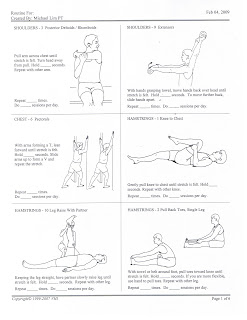zzzzzzzzzz
One of the beautiful things about a long productive, or not, day is that once your eyelids get heavy and you begin to feel slow, there is always refuge in sleep. Amongst plenty of benefits to getting some zzz's one will usually be able to start anew after a good night sleep.
For millions, sleep doesn't come so easily. There are several reasons one might not get enough of it: Parenting smaller children, chronic pain, insomnia, uncomfortable beds, demanding work schedules, and unfortunately this will impact many other aspects of life.
It is unsure, or not completely agreed on by scientists, as to what amount of sleep is adequate for performance, however some guidelines do exist. For infants 12 to 18 hours is typical (despite waking often for feedings), toddlers average anywhere between 11 and 15 hours, children over five years get about 9 to 13 hours and tweens and teens often like to sleep 9 or 10 hours (regardless of needing to be awake for such things like school, many insist on going to bed very late thus not getting the recommended hours of sleep for their ever changing physiological selves). Adults, including the elderly, should get about 7 or 8 hours per night, this is for optimum performance and restoration. We all know this is not the norm for many people, as just mentioned. In some cultures (and several developing countries) it is lucky if a working adult gets 5 hours of sleep per night. This lack of rest, the deep kind, could produce undesired side effects.
Many averse effects from little sleep, such as poor concentration, lack of energy, poor eating habits resulting from fatigue, weakened immune system, all tally up for a not-so-hot day. If you are trying to recover from a cold, a minor or major injury, it's especially important to let the natural course occur and let your body do its thing.
Sleep is one of the most simple things that both east and western healers recommend. Your GP will say, "Take a couple of Advil's, get some rest, and call me in the morning". Equally, most alternative healers will also recommend sleep and rest for many stress related ailments. It's such a simple concept however many of us overlook its incredible power, especially for healing.
Last week I was napping, a lot. And I couldn't put my finger on it, why was I so tired I wondered? Sure, the shorter, darker, colder days that November bring to Toronto are much to blame I'm sure, but maybe it was my body telling me that I needed it (it really is too bad that we, North Americans, have yet to adopt the much loved siesta or afternoon rest time that some other countries have), but needless to say, this week I've been feeling better and haven't needed the extra snoozes.
There are so many good things about sleeping, like restoration of the immune system, relaxation from energy spent during the waking hours, healing of many illnesses and the reconstruction of overused or overtired cells.
Here are a couple of ideas, not necessarily new ones, that can promote a good nights sleep.
Pillows. I made a couple of new decorative cushions by using some left over fabric and tons of plastic shopping bags for the stuffing that had accumulated when they were still free).
http://www.ikea.com/ca/en/catalog/categories/range/10374/10659/
Chamomile. Lavender. These plants are very friendly and easy to grow (except not in the same pot together, the lavender will take over), and they are lovely in a tea right before bed, or in a pouch under your pillow.
Reading. The soothing and relaxing activity of reading is wonderful for letting your thoughts drift from the stresses of the day (except reading from a computer will make your eyes and brain wig out even more so try to turn it off at least two hours before bed).
Walking. Going for a walk after dinner (eating preferably three hours prior to bedtime) is something you can do at any age and it'll help you digest so your body can focus on sleeping instead of digesting.
Avoid stimulants. Coffee, chocolate, alcohol or anything that will give your body zip should be avoided on a night when you plan to get well rested.
No matter how you look at it, sleeping is the bomb! It provides us with time to process life's mysteries, perhaps while dreaming, it helps us recover from life's viral challenges, it entices us with its semi-fluid or REM comfort, and it allows us to "shut down" and take a time-out. For some people, sleeping is considered a waste of time (I used to think this way), however it is an essential part of existing. It's almost like breathing.
You inhale, then you exhale.
You're awake, then you sleep.
Sounds good to me!
For millions, sleep doesn't come so easily. There are several reasons one might not get enough of it: Parenting smaller children, chronic pain, insomnia, uncomfortable beds, demanding work schedules, and unfortunately this will impact many other aspects of life.
It is unsure, or not completely agreed on by scientists, as to what amount of sleep is adequate for performance, however some guidelines do exist. For infants 12 to 18 hours is typical (despite waking often for feedings), toddlers average anywhere between 11 and 15 hours, children over five years get about 9 to 13 hours and tweens and teens often like to sleep 9 or 10 hours (regardless of needing to be awake for such things like school, many insist on going to bed very late thus not getting the recommended hours of sleep for their ever changing physiological selves). Adults, including the elderly, should get about 7 or 8 hours per night, this is for optimum performance and restoration. We all know this is not the norm for many people, as just mentioned. In some cultures (and several developing countries) it is lucky if a working adult gets 5 hours of sleep per night. This lack of rest, the deep kind, could produce undesired side effects.
Many averse effects from little sleep, such as poor concentration, lack of energy, poor eating habits resulting from fatigue, weakened immune system, all tally up for a not-so-hot day. If you are trying to recover from a cold, a minor or major injury, it's especially important to let the natural course occur and let your body do its thing.
Sleep is one of the most simple things that both east and western healers recommend. Your GP will say, "Take a couple of Advil's, get some rest, and call me in the morning". Equally, most alternative healers will also recommend sleep and rest for many stress related ailments. It's such a simple concept however many of us overlook its incredible power, especially for healing.
Last week I was napping, a lot. And I couldn't put my finger on it, why was I so tired I wondered? Sure, the shorter, darker, colder days that November bring to Toronto are much to blame I'm sure, but maybe it was my body telling me that I needed it (it really is too bad that we, North Americans, have yet to adopt the much loved siesta or afternoon rest time that some other countries have), but needless to say, this week I've been feeling better and haven't needed the extra snoozes.
There are so many good things about sleeping, like restoration of the immune system, relaxation from energy spent during the waking hours, healing of many illnesses and the reconstruction of overused or overtired cells.
Here are a couple of ideas, not necessarily new ones, that can promote a good nights sleep.
Pillows. I made a couple of new decorative cushions by using some left over fabric and tons of plastic shopping bags for the stuffing that had accumulated when they were still free).
http://www.ikea.com/ca/en/catalog/categories/range/10374/10659/
Chamomile. Lavender. These plants are very friendly and easy to grow (except not in the same pot together, the lavender will take over), and they are lovely in a tea right before bed, or in a pouch under your pillow.
Reading. The soothing and relaxing activity of reading is wonderful for letting your thoughts drift from the stresses of the day (except reading from a computer will make your eyes and brain wig out even more so try to turn it off at least two hours before bed).
Walking. Going for a walk after dinner (eating preferably three hours prior to bedtime) is something you can do at any age and it'll help you digest so your body can focus on sleeping instead of digesting.
Avoid stimulants. Coffee, chocolate, alcohol or anything that will give your body zip should be avoided on a night when you plan to get well rested.
No matter how you look at it, sleeping is the bomb! It provides us with time to process life's mysteries, perhaps while dreaming, it helps us recover from life's viral challenges, it entices us with its semi-fluid or REM comfort, and it allows us to "shut down" and take a time-out. For some people, sleeping is considered a waste of time (I used to think this way), however it is an essential part of existing. It's almost like breathing.
You inhale, then you exhale.
You're awake, then you sleep.
Sounds good to me!


Comments
Post a Comment